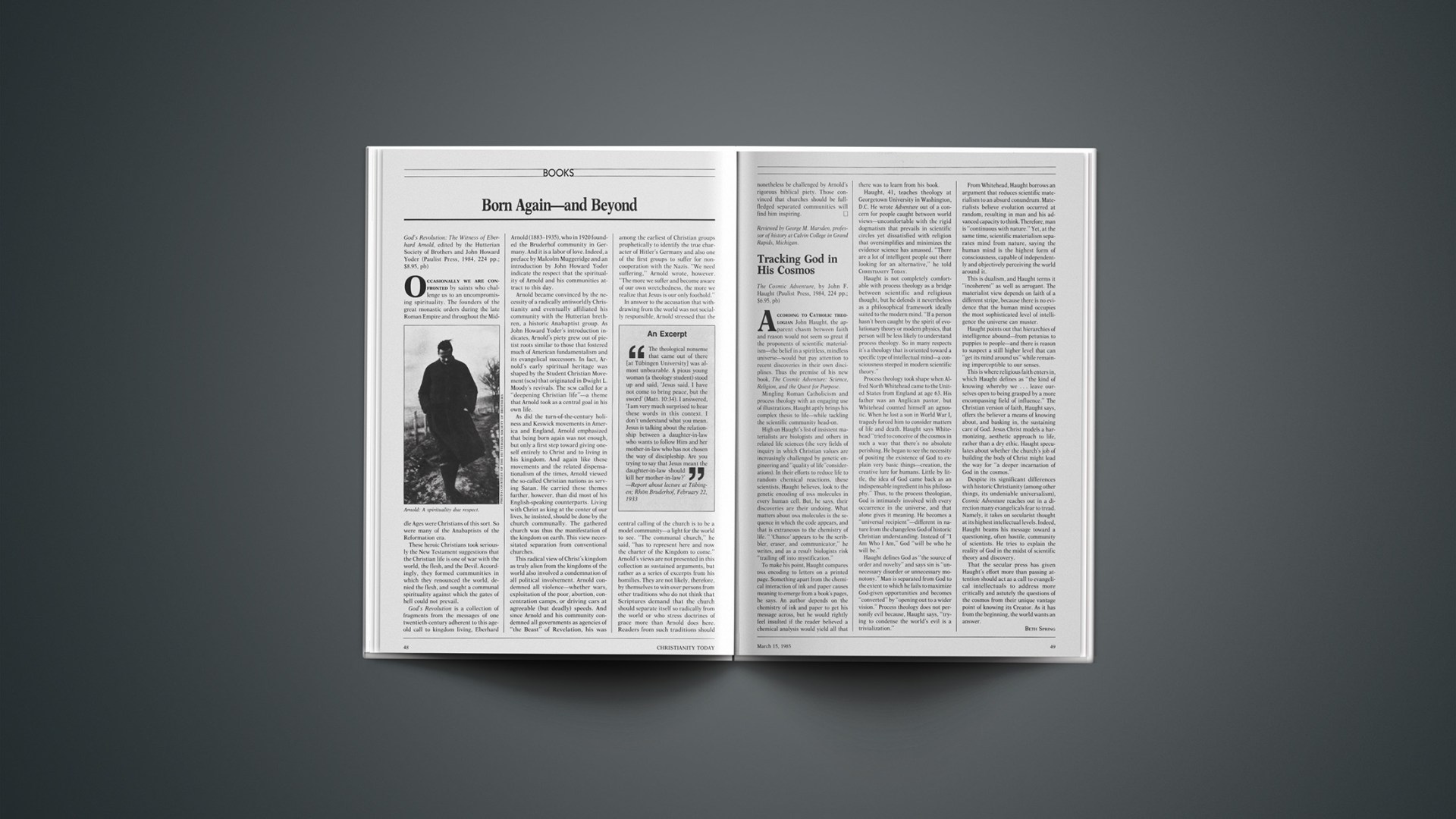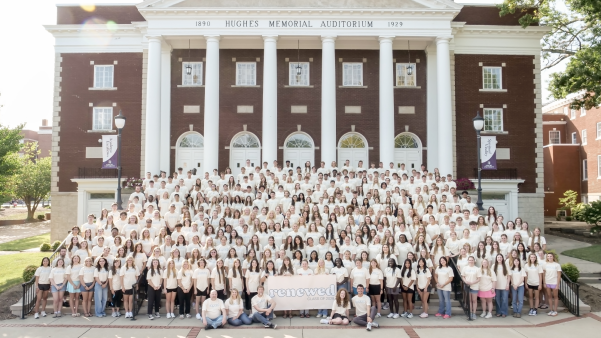God’s Revolution: The Witness of Eberhard Arnold, edited by the Hutterian Society of Brothers and John Howard Yoder (Paulist Press, 1984, 224 pp.; $8.95, pb)
Occasionally we are confronted by saints who challenge us to an uncompromising spirituality. The founders of the great monastic orders during the late Roman Empire and throughout the Middle Ages were Christians of this sort. So were many of the Anabaptists of the Reformation era.
These heroic Christians took seriously the New Testament suggestions that the Christian life is one of war with the world, the flesh, and the Devil. Accordingly, they formed communities in which they renounced the world, denied the flesh, and sought a communal spirituality against which the gates of hell could not prevail.
God’s Revolution is a collection of fragments from the messages of one twentieth-century adherent to this age-old call to kingdom living, Eberhard Arnold (1883–1935), who in 1920 founded the Bruderhof community in Germany. And it is a labor of love. Indeed, a preface by Malcolm Muggeridge and an introduction by John Howard Yoder indicate the respect that the spirituality of Arnold and his communities attract to this day.
Arnold became convinced by the necessity of a radically antiworldly Christianity and eventually affiliated his community with the Hutterian brethren, a historic Anabaptist group. As John Howard Yoder’s introduction indicates, Arnold’s piety grew out of pietist roots similar to those that fostered much of American fundamentalism and its evangelical successors. In fact, Arnold’s early spiritual heritage was shaped by the Student Christian Movement (SCM) that originated in Dwight L. Moody’s revivals. The SCM called for a “deepening Christian life”—a theme that Arnold took as a central goal in his own life.
As did the turn-of-the-century holiness and Keswick movements in America and England, Arnold emphasized that being born again was not enough, but only a first step toward giving oneself entirely to Christ and to living in his kingdom. And again like these movements and the related dispensationalism of the times, Arnold viewed the so-called Christian nations as serving Satan. He carried these themes further, however, than did most of his English-speaking counterparts. Living with Christ as king at the center of our lives, he insisted, should be done by the church communally. The gathered church was thus the manifestation of the kingdom on earth. This view necessitated separation from conventional churches.
This radical view of Christ’s kingdom as truly alien from the kingdoms of the world also involved a condemnation of all political involvement. Arnold condemned all violence—whether wars, exploitation of the poor, abortion, concentration camps, or driving cars at agreeable (but deadly) speeds. And since Arnold and his community condemned all governments as agencies of “the Beast” of Revelation, his was among the earliest of Christian groups prophetically to identify the true character of Hitler’s Germany and also one of the first groups to suffer for noncooperation with the Nazis. “We need suffering,” Arnold wrote, however. “The more we suffer and become aware of our own wretchedness, the more we realize that Jesus is our only foothold.”
An Excerpt
“The theological nonsense that came out of there [at Tübingen University] was almost unbearable. A pious young woman (a theology student) stood up and said, ‘Jesus said, I have not come to bring peace, but the sword’ (Matt. 10:34). I answered, ‘I am very much surprised to hear these words in this context. I don’t understand what you mean. Jesus is talking about the relationship between a daughter-in-law who wants to follow Him and her mother-in-law who has not chosen the way of discipleship. Are you trying to say that Jesus meant the daughter-in-law should kill her mother-in-law?’ ”
—Report about lecture at Tübingen; Rhön Bruderhof, February 22, 1933
In answer to the accusation that withdrawing from the world was not socially responsible, Arnold stressed that the central calling of the church is to be a model community—a light for the world to see. “The communal church,” he said, “has to represent here and now the charter of the Kingdom to come.” Arnold’s views are not presented in this collection as sustained arguments, but rather as a series of excerpts from his homilies. They are not likely, therefore, by themselves to win over persons from other traditions who do not think that Scriptures demand that the church should separate itself so radically from the world or who stress doctrines of grace more than Arnold does here. Readers from such traditions should nonetheless be challenged by Arnold’s rigorous biblical piety. Those convinced that churches should be full-fledged separated communities will find him inspiring.
Reviewed by George M. Marsden, professor of history at Calvin College in Grand Rapids, Michigan.
Tracking God In His Cosmos
The Cosmic Adventure, by John F. Haught (Paulist Press, 1984, 224 pp.; $6.95, pb)
According to Catholic theologian John Haught, the apparent chasm between faith and reason would not seem so great if the proponents of scientific materialism—the belief in a spiritless, mindless universe—would but pay attention to recent discoveries in their own disciplines. Thus the premise of his new book, The Cosmic Adventure: Science, Religion, and the Quest for Purpose.
Mingling Roman Catholicism and process theology with an engaging use of illustrations, Haught aptly brings his complex thesis to life—while tackling the scientific community head-on.
High on Haught’s list of insistent materialists are biologists and others in related life sciences (the very fields of inquiry in which Christian values are increasingly challenged by genetic engineering and “quality of life” considerations). In their efforts to reduce life to random chemical reactions, these scientists, Haught believes, look to the genetic encoding of DNA molecules in every human cell. But, he says, their discoveries are their undoing. What matters about DNA molecules is the sequence in which the code appears, and that is extraneous to the chemistry of life. “ ‘Chance’ appears to be the scribbler, eraser, and communicator,” he writes, and as a result biologists risk “trailing off into mystification.”
To make his point, Haught compares DNA encoding to letters on a printed page. Something apart from the chemical interaction of ink and paper causes meaning to emerge from a book’s pages, he says. An author depends on the chemistry of ink and paper to get his message across, but he would rightly feel insulted if the reader believed a chemical analysis would yield all that there was to learn from his book.
Haught, 41, teaches theology at Georgetown University in Washington, D.C. He wrote Adventure out of a concern for people caught between world views—uncomfortable with the rigid dogmatism that prevails in scientific circles yet dissatisfied with religion that oversimplifies and minimizes the evidence science has amassed. “There are a lot of intelligent people out there looking for an alternative,” he told CHRISTIANITY TODAY.
Haught is not completely comfortable with process theology as a bridge between scientific and religious thought, but he defends it nevertheless as a philosophical framework ideally suited to the modern mind. “If a person hasn’t been caught by the spirit of evolutionary theory or modern physics, that person will be less likely to understand process theology. So in many respects it’s a theology that is oriented toward a specific type of intellectual mind—a consciousness steeped in modern scientific theory.”
Process theology took shape when Alfred North Whitehead came to the United States from England at age 63. His father was an Anglican pastor, but Whitehead counted himself an agnostic. When he lost a son in World War I, tragedy forced him to consider matters of life and death. Haught says Whitehead “tried to conceive of the cosmos in such a way that there’s no absolute perishing. He began to see the necessity of positing the existence of God to explain very basic things—creation, the creative lure for humans. Little by little, the idea of God came back as an indispensable ingredient in his philosophy.” Thus, to the process theologian, God is intimately involved with every occurrence in the universe, and that alone gives it meaning. He becomes a “universal recipient”—different in nature from the changeless God of historic Christian understanding. Instead of “I Am Who I Am,” God “will be who he will be.”
Haught defines God as “the source of order and novelty” and says sin is “unnecessary disorder or unnecessary monotony.” Man is separated from God to the extent to which he fails to maximize God-given opportunities and becomes “converted” by “opening out to a wider vision.” Process theology does not personify evil because, Haught says, “trying to condense the world’s evil is a trivialization.”
From Whitehead, Haught borrows an argument that reduces scientific materialism to an absurd conundrum. Materialists believe evolution occurred at random, resulting in man and his advanced capacity to think. Therefore, man is “continuous with nature.” Yet, at the same time, scientific materialism separates mind from nature, saying the human mind is the highest form of consciousness, capable of independently and objectively perceiving the world around it.
This is dualism, and Haught terms it “incoherent” as well as arrogant. The materialist view depends on faith of a different stripe, because there is no evidence that the human mind occupies the most sophisticated level of intelligence the universe can muster.
Haught points out that hierarchies of intelligence abound—from petunias to puppies to people—and there is reason to suspect a still higher level that can “get its mind around us” while remaining imperceptible to our senses.
This is where religious faith enters in, which Haught defines as “the kind of knowing whereby we … leave ourselves open to being grasped by a more encompassing field of influence.” The Christian version of faith, Haught says, offers the believer a means of knowing about, and basking in, the sustaining care of God. Jesus Christ models a harmonizing, aesthetic approach to life, rather than a dry ethic. Haught speculates about whether the church’s job of building the body of Christ might lead the way for “a deeper incarnation of God in the cosmos.”
Despite its significant differences with historic Christianity (among other things, its undeniable universalism), Cosmic Adventure reaches out in a direction many evangelicals fear to tread. Namely, it takes on secularist thought at its highest intellectual levels. Indeed, Haught beams his message toward a questioning, often hostile, community of scientists. He tries to explain the reality of God in the midst of scientific theory and discovery.
That the secular press has given Haught’s effort more than passing attention should act as a call to evangelical intellectuals to address more critically and astutely the questions of the cosmos from their unique vantage point of knowing its Creator. As it has from the beginning, the world wants an answer.
BETH SPRING










